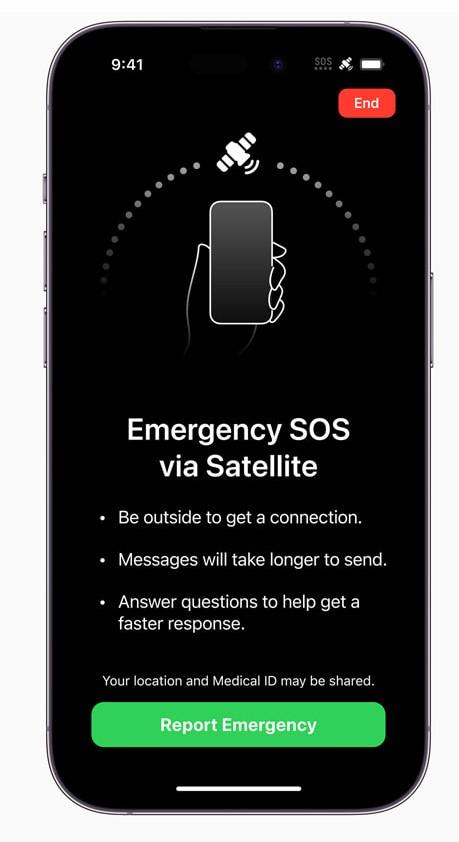Apple introduced a slew of new products and upgrades Wednesday, but three features stand out for sensor and chip geeks: Emergency SOS connectivity via satellite and car crash detection in all four new iPhones and the fastest chip in a smartphone, the A16 Bionic for Apple’s new iPhone 14 Pro and 14 Pro Max models.
The SOS feature allows users of the two new Pro models and the iPhone 14 and iPhone 14 Plus to make an emergency connection to a comms satellite when the phone is pointed at it for up to 15 seconds as it moves through the sky. The process required Apple years of work to coordinate with carriers and to create short text messages with emergency services or voice when text is not available.
It also works with the Find My app already available from Apple, allowing users to tell friends where they are via satellite without even sending a message.
Emergency SOS will be free in iPhone 14 for two years and will launch in November in the US and Canada.

A16 Bionic chip
The A16 Bionic chip for two the Pro models provides 16 billion transistors and is built on the 4 nm process. According to Apple pitchman Greg “Joz” Joswiak, it is the “fastest chip ever in a smartphone…competitors are still working to catch up with Apple’s A13 chip introduced in the iPhone 11.”
Inside the A16, a 6-core CPU includes two high performance cores and four high efficiency cores. A new 16-core neural engine provides 17 trillion computations per second. A 5-core GPU has 50% more memory bandwidth, valuable for gaming.
The features of the A16 support new camera capabilities for stills and video, including a 48 megapixel main camera and a Photonic Engine for computational photography. The chip’s image signal processor works with other components to perform up to 4 trillion operations per photo for greater clarity and color in dark shots. An always on display and all-day battery life are part of the Pro models as well as a Dynamic Island that provides interactions in the display.
In a statement, Apple said the chip delivers “more performance with a fraction of the power compared to the competition” but no specs were revealed.
Car crash sensing
Car crash detection is a new feature in all four iPhone 14 models supported by a new high dynamic gyroscope, new dual-core accelerometer and GPS with the ability to call emergency services. Apple said the new dual-core accelerometer can detect G-force measurements of up to 256 Gs. The barometer in the phones can now detect cabin pressure changes, while the microphone can recognize loud noises from a severe car crash. Apple used algorithms trained with more than 1 million hours of real-world driving and crash record data.
Crash detection is also provided in the new Apple Watch Ultra and Apple Watch Series 8 and the new more affordable Apple Watch SE.
H2 chip for AirPods Pro
Apple also announced a new H2 chip for the its second generation AirPods Pro to provide upgrades in active noise cancellation and transparency modes. It also provides touch control for media playback and volume adjustments.H2 offers on-device processing to reduce loud environmental noise like a passing truck or construction noise.
Pricing, yes
The iPhone 14 Pro starts at $999, the same price as the previous version, while the iPhone 14 Pro Max goes for $1,099 with available storage up to 1 TB. Meanwhile, iPhone 14 goes for $799 and iPhone 14 Plus for $899. Apple encouraged trade-ins of older phones to be recycled and offers trade-in discounts. The iPhone 14, Pro and Pro Max models ship Sept. 16, while iPhone 14 Plus ships Oct. 7.
The iPhone 14 is a 6.1-inch design, while the Plus is a new 6.7-inch design. Apple designated the iPhone 14 Pro as a 6.06-inch screen while the Pro Max 6.68 inches.
Apple Watch Series 8 starts at $399 and Apple Watch SE starts at $249, with availability starting Sept. 16. Apple Watch Ultra is available Sept. 23 for $799.